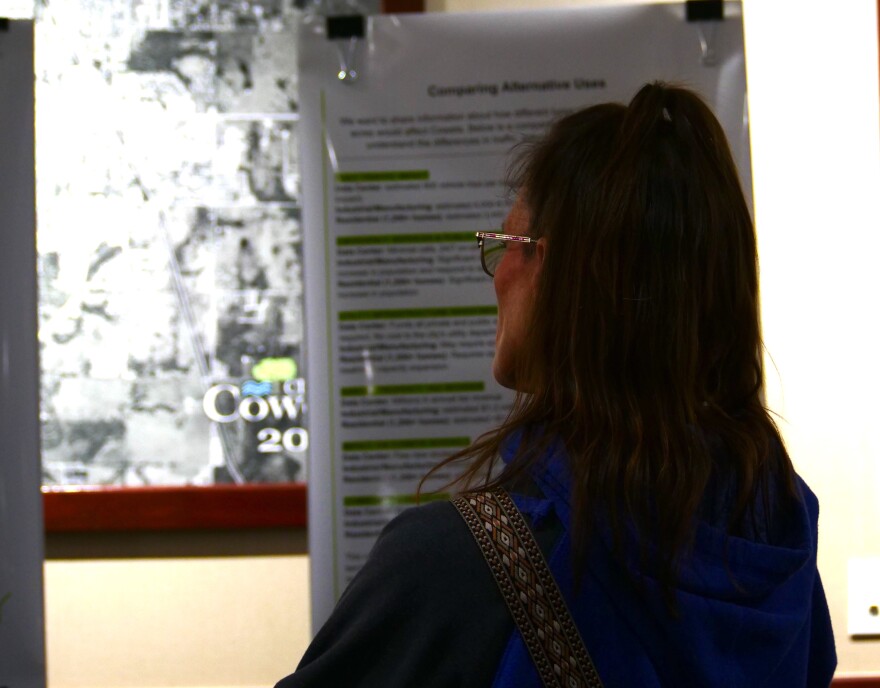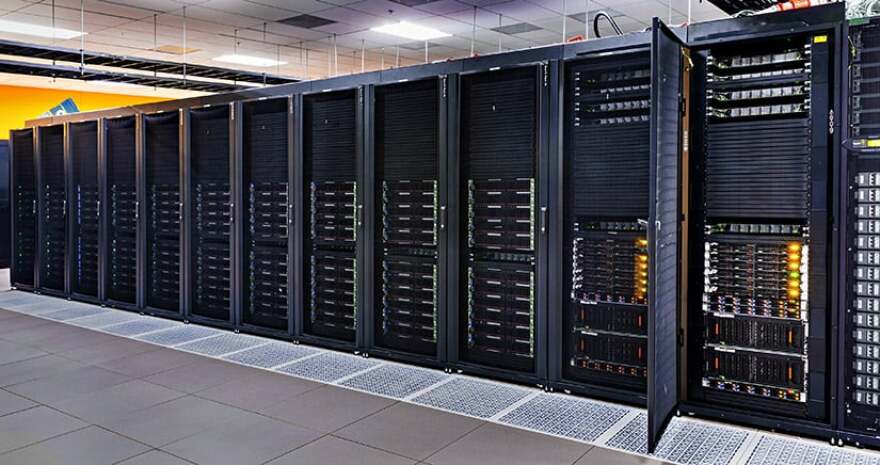Coweta City Hall was packed and humming with conversation. Community members and people from farther away queued to get in, the line stretching out the door and into the late-October damp. They hoped to learn about Project Atlas, a massive data center looking to come to town.
Among them was Patrick Sampson, who lives less than a mile from the facility's proposed site.
"I wanted to make sure that I have a better understanding of what they're going to put there and how it's going to affect our community — good and bad, the positive and negative," Sampson said.
He'd come to the right place. Representatives from Beale Infrastructure, the developer behind the proposed facility, stood by posterboards with an assuredly sunny response to every question about the project. Out-of-town advocates against the data center filtered through the crowd, warning of strained water supplies and a flurry of unwelcome energy projects if the facility is approved.
Coweta isn't the only Oklahoma community where those conversations are happening. Oklahoma City and Yukon officials are facing zoning issues for a data center, while Google announced plans for a new facility in Muskogee earlier this month. Stillwater and Owasso already have projects further along in development.
"They're very intense," Oklahoma City Planning Director Geoffrey Butler said. "They require a lot of energy to use to operate and a lot of water often. And so they're just different from what the city is used to — similar in some ways to some other industrial development, but quite different."
Communities across Oklahoma and the rest of the country are grappling with how to take advantage of the economic benefits data centers offer while protecting their residents from concerns that include resource depletion, pollution and aesthetic concerns.
Tony Burkhart with Beale Infrastructure, the company developing the data center in Coweta, said he wants Project Atlas to be a win for both Beale and the community.
"One of the first things we want to do is meet with the community and meet with the people that actually live and work here to get a feel for what their concerns are," said Tony Burkhart with Beale Infrastructure. "What are they passionate about? What kinds of things can we look to partner with them on to bring value to places like Coweta?"
But when asked how that looked for other data center projects Beale has worked on, Burkhart went a little vague.
"There's a tug and a push and pull there," Burkhart said. "There are things that are technically possible, and then there are things that are not… But this is all a conversation that we need to be having in real time, both with the community but also with the local governments."
Why now, and why not?
Data centers have exploded into public consciousness recently. A building specifically to house computer servers is not a new concept — Oklahoma City alone is already home to nine small-scale data centers.
Butler said the data centers being proposed today aren't your father's data center — or your older brother's.
"Even five years ago, things were a lot different," Butler said. "Data centers have gone from being data storage to high-intensity data processing for AI."

Tech companies looking to profit from AI products want more huge, hyperscale data centers. Often, these are essentially data campuses that house multiple buildings for servers. They demand a lot of land, water and electricity.
"Like cell phone towers and transportation infrastructure, they're part of our infrastructure for modern society," Butler said. "They kind of have to go somewhere."
But many people don't want "somewhere" to be near them. Juliane Davis is one of them. She lives about ten miles south of Coweta in Porter, but her son attends Coweta Public Schools.
"We have concerns about water, health, power rates," Davis said. "We're concerned about property values."
Davis has been advocating against a proposed solar farm near her home for more than a year. She said it all feels connected because the data center would require such massive amounts of electricity. She also expects Project Atlas and the proposed solar farm to have similar effects on neighbors.
"My heart breaks for people that are surrounded by this proposed development," Davis said. "The solar project isn't even passed yet, but people won't buy. We had a neighbor down the road list her home, and once they found out there might be a project coming in of that scale, they backed out of the deal."
She said she feels municipalities are being enticed with promises of financial boons.
"It's hard when you feel like dollar signs are waved in front of really desperate cities, townships, counties, particularly in this kind of economy," Davis said.
Coweta City Manager Julie Casteen said the project is far from a done deal.
The city annexed the land last month, and they have a contract of sale with Beale Infrastructure. But the deal hasn't closed, and the area would need to be rezoned. The Coweta Planning Commission were supposed to consider the rezoning tonight, but that discussion has been pushed to next month at Beale's request.
"If the zoning happens, then it moves to the next step of can we actually supply the needs that they're requesting?" she said. "If we can't, they may give up and say, 'Okay, it's not going to work.'"
"Making accommodations" for data centers
Although some communities, including Stillwater, have offered incentives to developers looking for data center sites, many Oklahoma municipalities are fielding data center zoning applications with more agnosticism.

"A company that wants to develop land, they have the right to be heard by the Planning Commission and City Council, and for them to seriously consider their proposal," OKC Planning Director Butler said. "And it's not really yes or no. It's making accommodations. What reasonable regulations are required to make it so that it is a contributor to the community rather than being a detriment?"
The proposed site for a new Oklahoma City data center is just northwest of where Frisco Road crosses over Interstate 40. Straddling Yukon and Oklahoma City limits in Canadian County, the land is owned by the trust of Tony Kouba, a former state representative who died in 2021.
It's currently zoned for agricultural use, but Kouba's trust and Gamma Resources, LLC, have applied for zoning to allow "light industrial use and development, specifically a data center," according to a staff report from the OKC Planning Commission.
The application was deferred from the October Planning Commission meeting to the November meeting, and the applicants have requested that it be pushed back again to January.
When the OKC Planning Commissioners consider the application, they can refine it and make a recommendation to the City Council about whether to accept or reject the proposal. Ultimately, the City Council will vote on it.
The bulk of the site for that data center is in Yukon. The city recently created an ordinance to guide data center zoning in general. Although the ordinance doesn't finalize approvals for the proposed site, it met strong pushback at the meeting, where council members ultimately approved it.
"The absolute minimum you should do tonight is table this for further review, if not just axe it," Yukon resident Julia Seay told the city council at the August meeting. "The longer we sit here, the more questions I come up with. We have opposing information on data centers and it needs study."
Winners and losers
Coweta City Manager Casteen said t'here are benefits to be had when a data center moves in. If it moves forward, Project Atlas would pay annual fees in lieu of taxes to the city, county and school district. Cities that welcome data centers could also receive franchise fees from electric utilities seeing increased business.

"They showed us calculations for the school district, how it actually benefits them to do it that way," Casteen said. "So it will be a win for the school district. They're probably the biggest winner, I would say, in all this."
But Casteen said there are losers, too.
"Well, obviously there's people that live close to the data center site, and I am concerned and we're making sure we look out for their interests," she said. "[Development requirements] that will come with the rezoning will have specifications on what they have to meet as far as sound, light, a buffer zone. So we're trying to make everything so that it really doesn't affect those people."
Communities can fight data centers, and officials can work to balance costs with benefits. But OKC's Butler said developers are coming regardless, and local leaders need to be prepared
"We see these coming," Butler said. "One is here before us right now, and we see additional data centers coming our way. So we just want to make sure that we respond appropriately."
This is the first story in a series exploring data centers in Oklahoma. Installments coming out this week will examine water, electricity and other impacts.
This report was produced by the Oklahoma Public Media Exchange, a collaboration of public media organizations. Help support collaborative journalism by donating at the link at the top of this webpage.






